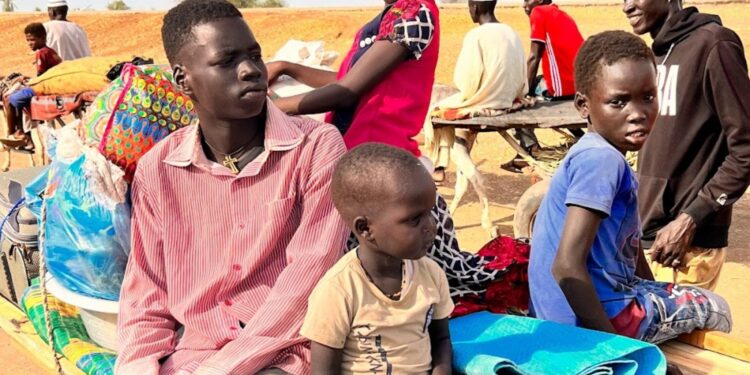In the heart of Ethiopia, a growing crisis unfolds as thousands of Sudanese refugees grapple with the stark realities of displacement and survival. The tumultuous political landscape in Sudan has driven many to seek refuge across the border, only to confront a new set of challenges exacerbated by resource scarcity and systemic barriers. Reports of refugees who have struggled to find stable shelter, secure employment, and access essential services paint a harrowing picture of life in exile. With limited support from humanitarian organizations and increasing strain on host communities, many Sudanese refugees find themselves in dire circumstances, often uttering the somber words, “I ended up homeless.” This article delves into the struggles faced by these refugees in Ethiopia, highlighting their resilience amid adversity and the urgent need for comprehensive responses to their plight.
Sudanese Refugees in Ethiopia Suffer Dire Living Conditions and Limited Resources
The influx of Sudanese refugees into Ethiopia has led to a situation where living conditions have become increasingly dire. Many newcomers find themselves with insufficient shelter, as overcrowded camps struggle to accommodate the rising population. Access to basic services, such as clean water and proper sanitation, is severely limited, forcing many families to endure unhygienic conditions. These hardships are exacerbated by a lack of food resources, as the humanitarian response falls short of meeting the overwhelming demand. Some refugees have reported relying on food distributions, which often run low, leaving them to scavenge for survival.
Moreover, the psychological toll of displacement weighs heavily on individuals already traumatized by violence in their homeland. Many families are split, with some members remaining in Sudan while others seek refuge in Ethiopia, resulting in feelings of isolation and despair. Children are particularly vulnerable, deprived not only of a stable home but also of access to education, exacerbating the cycle of poverty and hopelessness. Organizations providing support often face challenges in securing adequate funding, further limiting their ability to assist the growing number of refugees in urgent need of aid.
Challenges of Integration for Sudanese Refugees Amidst Growing Hostility in Ethiopia
The increasing tension in Ethiopia has created a hostile environment for Sudanese refugees who fled their homeland seeking safety. With growing xenophobia and discrimination, many refugees find themselves marginalized, facing barriers in accessing essential services such as healthcare, education, and employment. Reports indicate that hostility from local communities has escalated, resulting in numerous refugees being denied basic rights and protections. The unfriendly atmosphere has forced them into precarious living conditions, as some have resorted to makeshift shelters, living in overcrowded spaces or on the streets.
Moreover, the unpredictable political landscape in Ethiopia complicates integration efforts. Many refugees struggle with language barriers, limiting their chances of social acceptance and employment. Host communities often view them as competitors for scarce resources, exacerbating tensions. Organizations supporting refugees face significant challenges in delivering aid, as funding is dwindling amid rising local economic pressures. Additionally, increasing incidents of violence and theft targeting Sudanese refugees have been reported, leaving them feeling vulnerable and isolated. To mitigate these challenges, a collaborative approach involving government bodies, NGOs, and local communities is crucial for fostering understanding and solidarity.
Urgent Need for Humanitarian Aid and Policy Support for Vulnerable Refugee Populations
In Ethiopia, Sudanese refugees are grappling with dire living conditions, significantly exacerbated by a lack of adequate humanitarian assistance. Reports indicate that families are forced to endure extreme hardships, including food insecurity, inadequate shelter, and insufficient access to healthcare. As the influx of refugees continues, the response from international aid organizations has not kept pace. Many refugees describe harrowing experiences, with some stating they have ended up homeless, roaming the streets in search of help and security. Key challenges they face include:
- Food Shortages: Many refugee camps are struggling to provide even basic rations.
- Healthcare Access: Limited medical facilities hinder proper health services.
- Insecure Living Conditions: Refugees often find themselves in unsafe environments.
- Weak Policy Support: Insufficient government and international policies further marginalize these vulnerable populations.
As the situation intensifies, advocates and humanitarian organizations stress the urgent need for comprehensive policy support and increased funding to address these critical issues. A collaborative approach is essential; engaging local communities and leveraging regional resources can make a significant difference for the displaced population. Currently, the lack of strategic planning hampers effective responses to this crisis, highlighting the need for action on multiple fronts. Proposed solutions include:
| Proposed Action | Expected Outcome |
|---|---|
| Increase Food Aid | Mitigate immediate hunger and improve nutrition. |
| Expand Healthcare Access | Enhance health outcomes and reduce disease spread. |
| Improve Legal Support | Safeguard the rights of refugees and enhance their protection. |
| Strengthen Community Programs | Foster integration and provide social support networks. |
In Conclusion
In conclusion, the plight of Sudanese refugees in Ethiopia serves as a stark reminder of the ongoing humanitarian crises that often go unnoticed in the global discourse. Facing relentless challenges such as inadequate shelter, scarce resources, and limited access to essential services, these individuals and families grapple with the harsh realities of displacement. Their stories reflect not just a struggle for survival, but also a profound resilience in the face of adversity. As international attention shifts, it is crucial to uphold the dignity and rights of these refugees, ensuring that the global community acknowledges their suffering and advocates for their needs. Only through sustained support and a commitment to addressing the root causes of their plight can we hope to turn the tide for Sudanese refugees seeking safety and a chance to rebuild their lives.














